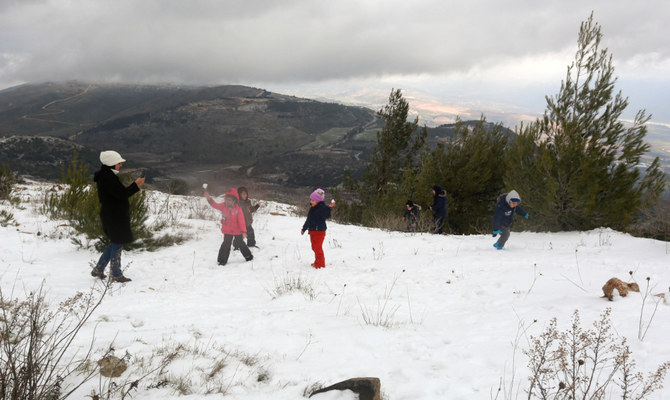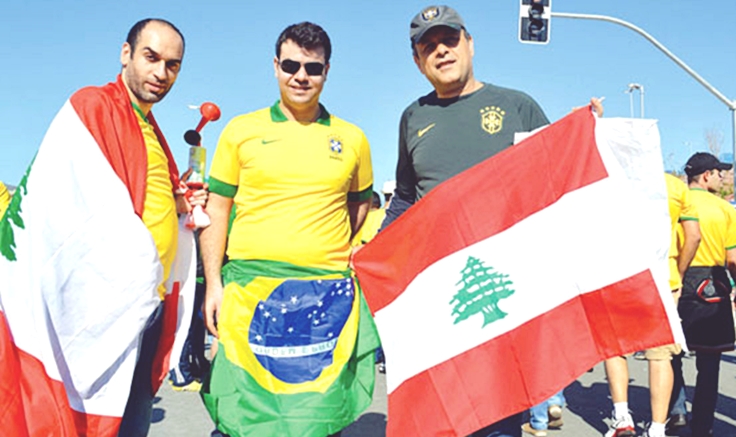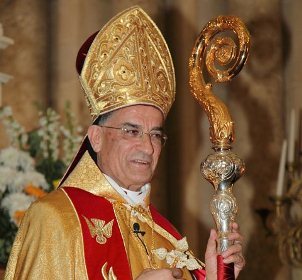
By Najia Houssari -- arabnews.com -- BEIRUT: People across Lebanon have been left stranded and struggling to find fuel for heating as snowstorm Yasmine continues to wreak havoc. President Michel Aoun’s media office said he had instructed the relevant authorities to provide assistance to people in affected areas and had been following the work of military, security and civil agencies as they sought to clear roads. As the storm intensified on Wednesday night, entire cities and villages in the Bekaa and northern regions were cut off, while power cuts left residents without heating. Snow fell at an altitude of 500 meters above sea level, leaving dozens of towns along the eastern and western mountain chains isolated. Most main and mountain roads at an altitude of 1,100 meters and above were completely cut off.
Snow also engulfed the runways at Beirut Airport, though did not prevent operations, and covered beaches in the northern cities of Byblos and Beirut and the southern city of Sidon. Also in Sidon, firefighters rushed to tackle a blaze after a school bus was set on fire by lightning. Along the banks of the Hasbani River in Shebaa and the neighboring villages of Arqoub the snowfall was recorded at up to a meter deep. Footage shot in some of the worst affected areas went viral on social media. In some regions the authorities issued warnings to motorists against driving as the freezing temperatures covered roads with ice. The Ministry of Public Works warned people against trying to find alternative routes around snow-blocked roads until the authorities had clarified the situation and issued guidance. The director-general of the Lebanese Civil Defense, Brig. Gen. Raymond Khattar, said the agency had responded to multiple calls from around the country, while the army said it was helping to get fuel to people in need and clear snow from roads. Meanwhile, many people have complained about not being able to buy gas or diesel to heat their homes as they have become too expensive and too scarce.

By EDUARDO CAMPOS LIMA -- arabnews.com -- SAO PAULO: The ongoing Lebanese socioeconomic crisis, and the devastating explosion at the Port of Beirut in August 2020, have led many Lebanese Brazilians to show greater interest in the Arab country’s affairs. Over the past couple of years, Lebanese Brazilians — whose numbers are estimated at between 3 million and 10 million — have promoted drives to assist Lebanon’s people, and have become more involved in its politics. This trend was intensified by a campaign launched in 2021 by the Lebanese Embassy in Brasilia to encourage Lebanese citizens living in Brazil to register to vote in elections scheduled for May. “Many Lebanese Brazilians know very little about Lebanon. But now I think people are more conscious and trying to be informed,” said trader Nagib Makhlouf, 69, who was born in Brazil but has Lebanese citizenship. He has already taken part in three Lebanese elections: Two in the country — he used to visit to see his mother, who lived there — and one from Brazil. “Lebanon is in such bad shape that many people in Brazil are outraged with the situation. I know a group of 10 Lebanese Jews who decided to register and vote for the first time,” Makhlouf said.
Lebanese-born Lody Brais, a community leader who helped publicize the embassy’s campaign, said more and more young Lebanese Brazilians have been manifesting their wish to get involved with Lebanon and help it overcome its crises. “The diaspora’s vote may help change Lebanese politics. People have lost confidence in politicians,” added Brais, who helped collect food and medicines to be donated to Beirut after the explosion. “Many descendants who have relatives there sent them money. Everybody was concerned for the victims.” At the time, lawyer Hanna Mtanios Hanna Jr., honorary consul of Lebanon in the Brazilian city of Goiania, received dozens of calls during his COVID-19 confinement from people who wanted to do something to help Beirut. “Grandchildren and great-grandchildren of Lebanese immigrants would call me saying they had a family connection with the country and wanted to help. Since then, their ties with Lebanon have been growing,” he said.

by NAJIA HOUSSARI -- arabnews.com -- BEIRUT: Maronite Patriarch Bechara Boutros Al-Rahi has reiterated the necessity of implementing the Taif Agreement, international resolutions and the removal of illegal weapons from Lebanon. The Taif Agreement, signed in 1989, aimed to provide "the basis for the end of the civil war and the return to political normality in Lebanon." Al-Rahi’s points are the demands mentioned in a paper handed last week to Lebanese authorities by Kuwait’s Foreign Minister Sheikh Ahmed Nasser Al-Sabah as the conditions for rebuilding trust between the Gulf states and Lebanon, after Saudi Arabia and others severed diplomatic and economic relations with Beirut. Al-Rahi reiterated his demand for “holding an international conference, announcing Lebanon’s neutrality and finding a solution to the problem of Syrian and Palestinian refugees.”
He said he was surprised by former Prime Minister Saad Hariri’s decision to suspend his involvement in political activities and his call to the Future Movement to neither contest the upcoming parliamentary elections nor nominate anyone to run on its behalf. He told a delegation of the Union of Editors: “I was surprised by the decision and did not expect it, as Hariri is moderate and I hope it does not lead to any crack in the Lebanese structure.” Earlier, Hariri said: “There is no room for any positive opportunity for Lebanon in light of Iranian influence, international confusion, national division, the rise of sectarian tensions and the deterioration of the state.” Parliament Speaker Nabih Berri said he was “saddened by Hariri’s decision,” and the leader of the Progressive Socialist Party Walid Jumblatt said he felt “orphaned.”
by al-monitor.com — The Lebanese government announced today a new electricity deal with Syria and Jordan. Lebanon’s Water and Energy Minister Walid …
Khazen History


Historical Feature:
Churches and Monasteries of the Khazen family

St. Anthony of Padua Church in Ballouneh
Mar Abda Church in Bakaatit Kanaan
Saint Michael Church in Bkaatouta
Saint Therese Church in Qolayaat
Saint Simeon Stylites (مار سمعان العامودي) Church In Ajaltoun
Virgin Mary Church (سيدة المعونات) in Sheilé
Assumption of Mary Church in Ballouneh
1 - The sword of the Maronite Prince
2 - LES KHAZEN CONSULS DE FRANCE
3 - LES MARONITES & LES KHAZEN
4 - LES MAAN & LES KHAZEN
5 - ORIGINE DE LA FAMILLE
Population Movements to Keserwan - The Khazens and The Maans
ما جاء عن الثورة في المقاطعة الكسروانية
ثورة أهالي كسروان على المشايخ الخوازنة وأسبابها
Origins of the "Prince of Maronite" Title
Growing diversity: the Khazin sheiks and the clergy in the first decades of the 18th century
Historical Members:
Barbar Beik El Khazen [English]
Patriach Toubia Kaiss El Khazen(Biography & Life Part1 Part2) (Arabic)
Patriach Youssef Dargham El Khazen (Cont'd)
Cheikh Bishara Jafal El Khazen
Patriarch Youssef Raji El Khazen
The Martyrs Cheikh Philippe & Cheikh Farid El Khazen
Cheikh Nawfal El Khazen (Consul De France)
Cheikh Hossun El Khazen (Consul De France)
Cheikh Abou-Nawfal El Khazen (Consul De France)
Cheikh Francis Abee Nader & his son Yousef
Cheikh Abou-Kanso El Khazen (Consul De France)
Cheikh Abou Nader El Khazen
Cheikh Chafic El Khazen
Cheikh Keserwan El Khazen
Cheikh Serhal El Khazen [English]
Cheikh Rafiq El Khazen [English]
Cheikh Hanna El Khazen
Cheikha Arzi El Khazen
Marie El Khazen